
 Dayton Reimer
The Hockey Writers
Dayton Reimer
The Hockey Writers
41
Reads
0
Comments
Ottawa Senators 2009 Draft Review
It would not be a stretch to say that the Ottawa Senators’ 2009 draft was a bust. A decade later, none of the nine players drafted are still with the franchise, and their first-round pick, which sat ninth overall, was one of the worst of the first round. While the team would find a number of talented players in the later rounds, only one found success in Ottawa, and all would go on to have bigger impacts with their new teams than they ever had with the Senators.
However, a deeper dive reveals that the 2009 draft has been crucial in helping the Senators make serious strides in their current rebuild. Players selected in the 2009 draft helped the Senators acquire some of their current stars as well as several prospects and early draft picks for the deep 2020 draft. While it hurts to have missed on some of the generational talent available in 2009, it can’t be considered a complete wash, as it has shaped the franchise into what it is today.
Early Rounds (1-2)
The 2009 draft was projected to have a very deep top end. Headlined by John Tavares and Victor Hedman, they were followed by the likes of Matt Duchene, Evander Kane, Brayden Schenn and Oliver Ekman-Larsson, making the top 10 incredibly enticing. Beyond them, though, was an incredibly deep second tier of players that could last well into the second round of the draft, and potentially even into the third.
The Senators had three picks in the first two rounds, including one among the coveted top-10. While it was expected that these selections would form the backbone of the Senators, the reality was far more sobering.
Round 1, 9th Overall – Jared Cowen, D (Spokane Chiefs, WHL)
Cowen was one of the most highly touted defensemen to enter the 2009 draft behind Hedman. Standing 6-foot-5 and weighing well over 200 pounds, he had been a dominant force for the Spokane Chiefs, helping the team win the WHL championship and the Memorial Cup in 2008. He was seen as one of the best shut-down defensemen in the draft, drawing comparisons to Darian Hatcher and Zdeno Chara. At one point, the NHL’s Central Scouting Service ranked him as the third-best North American player, but by the final rankings, he’d slipped down to ninth.
Much of his slip had to do with a season-ending ACL injury, shortening his season to just 48 games. Still, he managed to score 21 points in that span despite playing a defensive role, and was seen as an incredibly reliable player. Despite his slip in rank, many mock drafts had him going fifth or sixth overall, as he looked to be the total package of size and skill. So, when the Senators stepped up to call out their ninth-overall pick, they were ecstatic to have Cowen still on the board.
“Having size on your team is critical, and now we’ve got a big defender who plays a lot of minutes and will certainly be hard to play against.”
Senators’ general manager Bryan Murray on Jared Cowen
The initial returns on their prospect were promising. Cowen would end up making a full recovery in 2009-10 and go on to play for the Canadian World Junior team, winning a silver medal. He’d finish the season with 30 points in 59 games and even get a chance to don a Senators’ sweater for one game after the Chiefs were eliminated from the WHL playoffs. He’d spend another season in juniors, scoring a career-high 48 points in 58 games, as well as making an appearance for the AHL’s Binghamton Senators during their playoff run, before making the NHL in 2011-12.
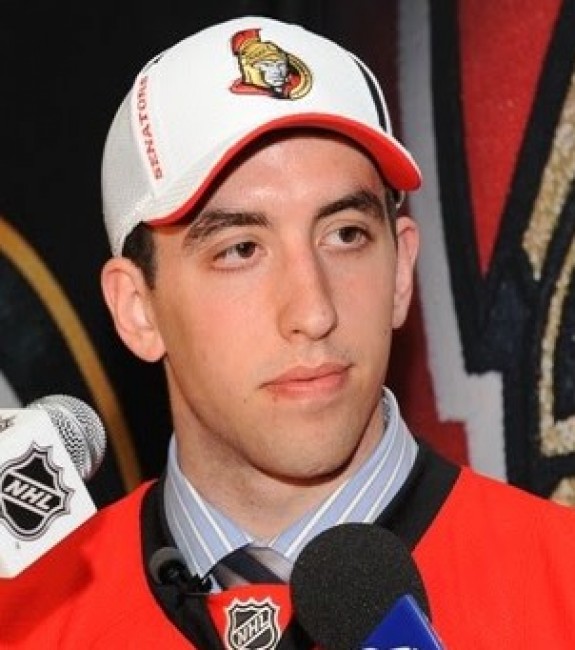
Cowen played all 82 games, scoring 17 points while pairing regularly with veteran Sergei Gonchar, and appeared in all seven playoff games. When the 2013 lockout hit, Cowen was assigned to the AHL to help him continue to develop into a top-pairing defender, but on Oct. 6, he suffered a supposed season-ending hip injury. Yet, he managed to return to the Senators ahead of schedule, joining them for their April 16 game against the Carolina Hurricanes, where he threw a giant open-ice hit and fought twice. It seemed that despite the injury scare, the Senators’ prized defenseman was still on track.
Sadly, things would start to go downhill quickly afterwards. After signing a four year, $3.1 million contract at the beginning of the 2013-14 season, he managed to play 68 games due to injury. The following season, he appeared in even less, often sitting out as a healthy scratch. On Feb. 9, 2016, the Senators made it official that they had moved on from Cowen as he was included in the nine-player deal with the Toronto Maple Leafs that brought Dion Phaneuf to Ottawa.
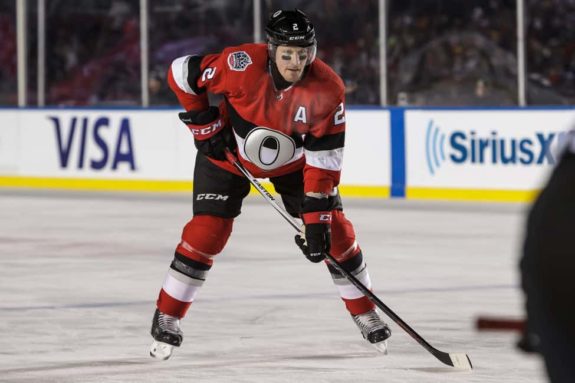
While the Phaneuf era was largely underwhelming, parts of that deal would eventually help the Senators to acquire Anthony Duclair from the Columbus Blue Jackets in 2018-19 along with two second-round picks in 2020. It was a steep price to pay, but in the end, it worked out for the Senators. Unfortunately, it went much worse for Cowen.
When the Maple Leafs’ acquired him, Cowen was sidelined with another hip injury. The Maple Leafs decided to sit him for the remainder of the 2015-16 season and try and buy out the defender, rather than wait until he was healthy. He was blown away by the team’s response and tried to fight it via arbitrator, but to no avail. By July 2016, he was a free agent. He agreed to a professional try-out with the Colorado Avalanche, but never made the team, so he retired at just 26 years old.
Missed Opportunity: Ryan Ellis, D – Drafted 11th by the Nashville Predators
Although Cowen is generally regarded as a bust, it was the right risk for the Senators as he was too highly rated to pass up. However, he did have injury concerns and, despite possessing good skating for a tall player, had difficulty with faster skaters. Had they reached and grabbed the CSS’s 16th-best North American skater, they could have had Ryan Ellis, who has become a 40-point defender with the Predators.
Round 2, 39th Overall – Jakob Slifverberg, RW (Brynas Jrs, Sweden)
The Senators had two picks in the second round and opted for two Swedes. The first was Jakob Silfverberg, ranked 12th among European skaters. He was a talented two-way forward, putting up 38 points over 30 games in the SuperElit Swedish junior league, and also appeared in 16 games in the Swedish Hockey League (SHL), scoring three goals and an assist. Although the winger was not projected to go within the top two rounds, the Senators grabbed him with the 39th pick, confident he could be a solid 200-foot player.
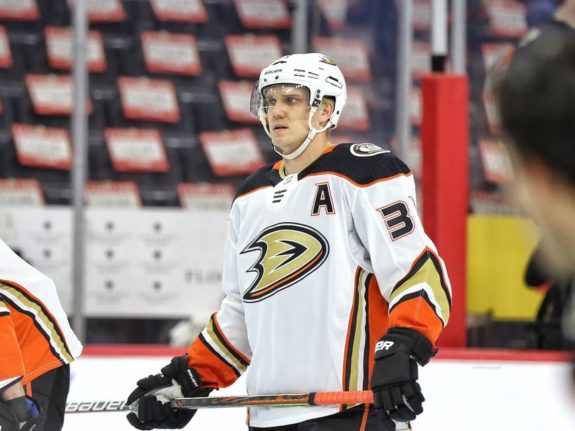
Silfverberg would remain in Sweden for the next three seasons, winning a bronze medal at the 2010 World Juniors, a silver medal at the 2011 World Championships, and earning the SHL’s MVP award in 2012 while the Senators eagerly awaited the arrival of one of their fastest-rising prospects. He made his NHL debut in the 2012 playoffs after his Swedish team was eliminated from the playoffs, and became a key member on an injury-ridden 2012-13 Senators’ squad that clinched a playoff spot.
But when the Anaheim Ducks began shopping 30-goal scorer Bobby Ryan, the Senators jumped at the opportunity and shipped Silfverberg, along with 2011 first-rounder Stefan Noesen and a first-round pick in 2014 for the skilled winger. Ryan has not been as effective with the Senators and the seven-year, $50-plus million contract has not aged well. However, he’s been one of the core members of a young, rebuilding team and was a key member of the 2017 playoff run.
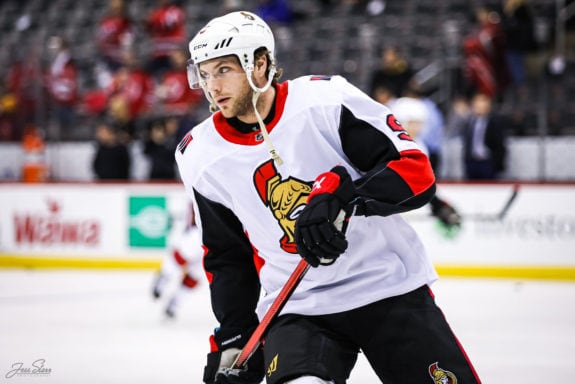
Silfverberg has become a consistent 45-point, two-way winger for the Ducks and the team’s future after Ryan Getzlaf. Noesen never lived up to his status as a first-rounder, and the 2014 pick was used on Nick Richie — a 10th-overall selection, who has struggled so far in his NHL career and is now playing with the Boston Bruins. While the Ducks arguably won the trade, it is looking more even as the years go by.
Missed Opportunity: None
Round 2, 46th Overall – Robin Lehner, G (Frolunda Jrs, Sweden)
With their second pick in round two, the Senators decided to grab a player who had plummeted down the draft charts. Robin Lehner was the top-ranked European goalie in the 2009 draft and had gained attention as a potential first-rounder, drawing comparisons to fellow Swede Henrik Lundqvist due to his size and butterfly style. However, there was quite a bit of risk attached, largely due to a sub-par performance at the 2009 U18 tournament, where he posted an underwhelming 2.80 goals-against average (GAA) and 2.18 save percentage (SV%) over four games.
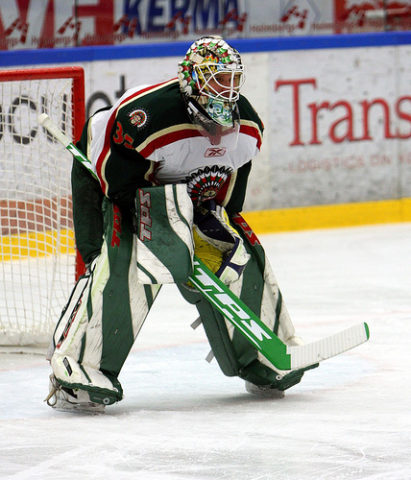
The selection was acquired from the Blue Jackets, along with goalie Pascal Leclaire, for veteran forward Antoine Vermette. Leclaire, a former eighth-overall selection, had failed to live up to his lofty hype, but had begun to show promise as a solid backup option. The Senators hadn’t had much luck in developing goalie prospects — Brian Elliott, drafted in 2003, was one of the only ones to pan out — so taking a chance on a highly talented but inconsistent goalie seemed worth the risk.
Lehner left Sweden the following season and joined the OHL’s Soo Greyhounds, where he was one of the best goalies in the league. After a quick playoff exit, he made his professional debut with the Binghamton Senators, winning both his appearances that season. He made his NHL debut the season after, replacing an injured Leclaire on Oct. 16, 2010, becoming the youngest Swedish goaltender to ever play in the NHL at just 19 years old.
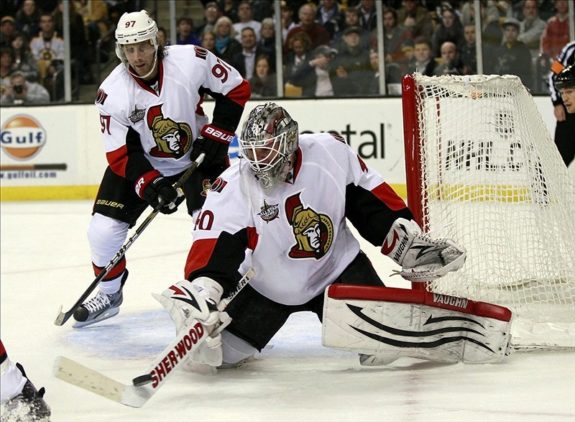
After helping Binghamton win the AHL’s Calder Cup and earning the league’s MVP award for his efforts, Lehner was suddenly one of the brightest goaltending prospects in the NHL. The Senators brought him up for the 2013-14 season to serve as Craig Anderson’s backup, and he posted a 0.913 SV% and a 3.06 GAA over 36 games. He demonstrated incredible promise as a top goalie in the league, and as the Senators hadn’t had a consistent starter since Patrick Lalime in 2004, they quickly signed the Swedish phenom to a three year, $6.675 million deal.
Yet, the story of Lehner with the Senators is one of unrealized potential. After a promising start, he struggled in 2014-15, and by the end of the season, the Senators decided to part ways with their top goalie prospect. Along with David Legwand, Lehner was sent to the Buffalo Sabres in exchange for the 21st-overall pick in 2015. While he has gone on to be one of the better starters in the NHL with the Sabres and New York Islanders, the pick was used on center Colin White, who has become a core member of the rebuilding Senators.
Missed Opportunity: None
Middle Rounds (3-5)
Round 4, 100th Overall – Chris Wideman, D (Miami-Ohio U., CCHA)
The Senators traded away their third-round pick to the Nashville Predators in order to acquire the pick that would bring them Erik Karlsson in 2008. Still, the selection of Wideman was a bit of an off-the-board pick; unranked by the CSS in both 2008 and 2009, the defender had shown the potential to be a solid offensive contributor. But at just 5-foot-10, there were plenty of questions about whether he could handle the bigger competition in the NHL.
Wideman spent the next four seasons at Miami-Ohio University where he was selected for the All-Rookie Team in 2009 and helped the RedHawks claim the NCAA Championship in 2010-11, leading all defensemen in assists. He then joined the Binghamton Senators, where he developed into one of the best defenders in the league. In 2014-15, he was an AHL All-Star, leading all defensemen in goals, assists and points, and received the Eddie Shore Trophy for the league’s best defenseman.
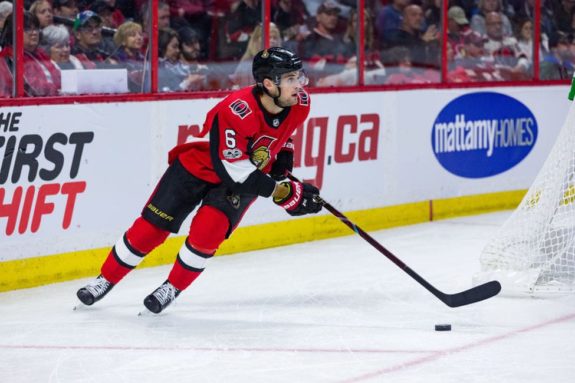
He made his NHL debut in 2015-16 and became a regular in the lineup, playing 64 games and scoring 13 points. He also was selected to the United States’ World Championship roster at the end of that season, where he was the team’s highest scoring defenseman. Wideman improved on his rookie season in 2016-17, scoring 17 points in 76 games, but a hamstring surgery ended his 2017-18 campaign after just 16 games. When he returned to the lineup, he looked to be missing a step, so the Senators decided to trade him in Nov. 2018 to the Edmonton Oilers for a sixth-round pick in 2020.
Related: Senators Showdown – Patrick Lalime vs. Craig Anderson
Over the course of three months, he would be traded three more times, failing to make an impact for each new team, and by the end of the 2018-19 season, he was left to free agency, where he signed a one-year, two-way deal with the Anaheim Ducks. He received a call-up in January, but has yet to play a game in the NHL in 2019-20.
Missed Opportunity: Sami Vatanen, D – Drafted 106th by the Anaheim Ducks
While Wideman was a pleasant surprise for the Senators, it’s tough to ignore that Vatanen was taken just six picks later. Ranked 16th among European skaters, he also slipped down the draft due to concerns over his size. However, he spent most of the 2009-10 and 2010-11 seasons playing in Finland’s top men’s league, an impressive feat for a teenager. When he joined the Ducks in 2013-14, he was clearly a step above some of his fellow rookies, scoring 21 points in 48 games.
Related: Devils’ Retool Should Start With Trading Vatanen
Vatanen developed into a power play specialist with the Ducks, and scored a career-high 38 points in 2015-16. He was traded to the New Jersey Devils during the 2017-18 season in exchange for Adam Henrique, among others. He has struggled with injury troubles and defensive inconsistencies, but has been one of the few bright spots on Jersey’s spotty blue line in 2019-20. He was dealt at the 2019-20 deadline to the Carolina Hurricanes for Janne Kuokkanen, Frederik Claessen and a conditional second-round pick in 2020.
Round 5, 130th – Mike Hoffman, LW (Drummondville Voltigeurs, QMJHL)
The Senators took another risk with their first fifth-round pick on another overage player. Born in 1989, Mike Hoffman was passed over twice before finally hearing his name called at the NHL draft. It wasn’t all that surprising; he had failed to make his hometown Kitchener Rangers in the OHL in 2006-07, moving on to find a place in the QMJHL, first for the Gatineau Olympiques, then the Drummondville Voltigeurs, as a supporting player that flew under many scouts’ radars.
Hoffman scored a combined 48 points in his first season in the QMJHL, but broke out in his sophomore campaign, scoring 96 points an scoring 52 goals, helping the Voltigeurs claim the QMJHL Championship. He was traded to the Saint John Sea Dogs for the 2009-10 season, where he solidified his place as a junior star. Despite playing just 56 games, he had 46 goals and 85 points, and was named the QMJHL’s Most Valuable Players and Most Sportsmanlike Player, as well as being selected to the CHL’s second All-Star team.
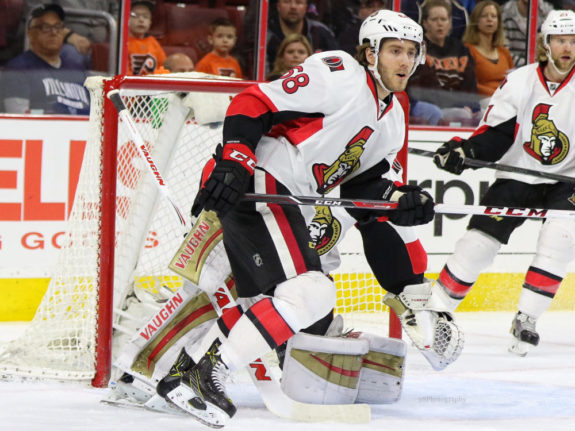
In his first professional season in the AHL, he scored 25 points, helping the Binghamton Senators win the Calder Cup. Over the next three seasons, he would bounce between the NHL and the AHL, until he’d finally stick with the NHL in 2014-15. In his rookie season, he would score 27 goals and 48 points and would finish sixth in Calder Trophy voting. Suddenly, this fifth-round pick in 2009, who had even spent some time in the ECHL (four games in 2010-11), was one of the best players on the Senators.
Hoffman would top out at 61 points in Ottawa in 2016-17, but came into some controversy with star Erik Karlsson in 2017-18, and it was clear that one of them would have to go to settle a broken locker room. So, Hoffman was sent to the Florida Panthers in a three-way deal that saw the Senators acquire Mikkel Boedker, Julius Bergman, and a sixth-round pick in 2020 from the San Jose Sharks.
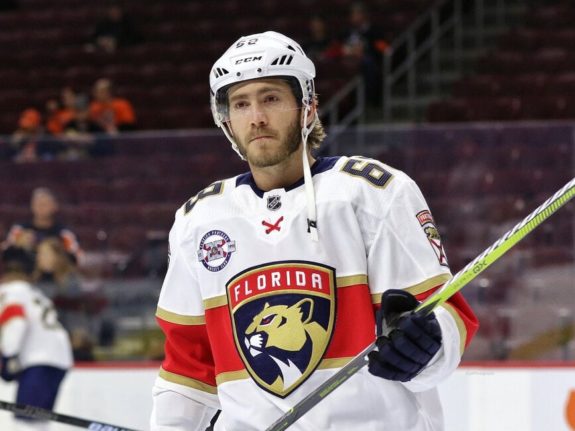
Hoffman would go on to record his best offensive season with the Panthers, scoring 36 goals and 70 points, while Bergman would accompany Matt Duchene in another deal to the Blue Jackets for Vitali Abramov, Jonathan Davidsson, and a first-round pick in 2019, used on Lassi Thomson. It was an unfortunate end to one of the Senators’ greatest draft gems, but at least the Senators were able to make something out of it.
Missed Opportunity: None
Round 5, 146th – Jeff Costello, LW (Ceder Rapids Roughriders, USHL)
The Senators used their second fifth-round pick to take Costello, ranked 50th among North American skaters. In his draft year, he put up 24 goals in 54 games with the Ceder Rapids Roughriders along with 73 penalty minutes. He spent one more year in the USHL before joining the University of Notre Dame, where he would establish himself as a hard-nosed, physical winger with leadership qualities.
In his senior year, his rights were traded to the Vancouver Canucks, then to the Tampa Bay Lightning, who would not sign him but bring him onto their training camp roster prior to the 2014-15 season. Costello failed to make the team, but signed an AHL contract with the Syracuse Crunch. After just two games, though, he was sent down to the ECHL, where he played just 28 games before suffering a career-ending upper-body injury in Jan. 2015.
Missed Opportunity: Anders Lee, LW – Drafted 152nd by the New York Islanders
Drafting out of high school is always a huge risk, but it can pay huge dividends. Had the Senators decided to take a bigger risk with their second fifth-round pick, they could have had Anders Lee. Ranked 118th by the CSS, he had been dominant for his Minnesota high school, but concerns about whether he could continue to produce at higher levels caused him to be passed over in the 2008 draft, and nearly the 2009 draft until the New York Islanders took him six picks after Costello.
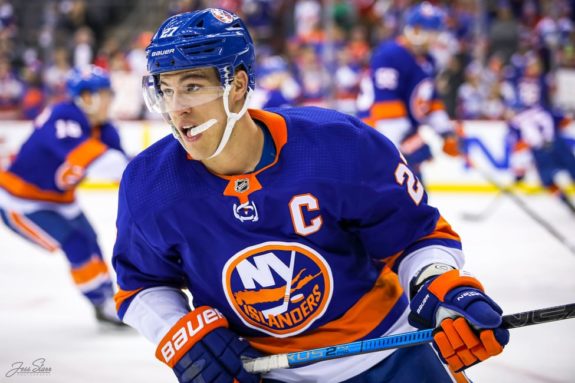
Surprisingly, Lee’s goal-scoring pace never wavered, and he led the University of Notre Dame in goals each of the three years he spent there. When he joined the Islanders, he was second in goals by his sophomore season. In 2019-20, amid speculation he would be traded, he was re-signed to a six-year, $7 million deal, cementing him as the premier star on Long Island.
Late Rounds (6-7)
Round 6, 160th – Corey Cowick, LW (Ottawa 67’s, OHL)
Having a junior team in the same city as an NHL franchise can be a huge benefit for both, and the Senators have frequently taken advantage of having the Ottawa 67’s in their own backyard. In 2009, they picked hometown player Corey Cowick. An overage forward who was playing regularly with star Logan Couture on the first line, he’d broken out in 2008-09, scoring 34 goals and 60 points, the second-highest goal total on the team.
Related: Senators 2000 Draft – It Could Have Been Worse
Cowick spent one more season with the 67’s, but only appeared in 28 games due to a nagging shoulder injury. He made his pro debut in 2010-11 with the Binghamton Senators, but was shuffled between the AHL and ECHL for the next two seasons before becoming a Binghamton regular. He scored a career-high 35 points in 2013-14, but never made the jump to the NHL and had retired by 2016-17 after a brief stint playing hockey in Scotland.
Missed Opportunity: Darcy Kuemper, G – Drafted 161st by the Minnesota Wild
As previously mentioned, the Senators have had an awful time developing and maintaining goalie prospects. Had they taken Kuemper in 2009, maybe it would have changed their fortunes. A star with the WHL’s Red Deer Rebels, he would make his NHL debut in 2012-13, slowly establishing himself as a reliable backup goalie with the Minnesota Wild. However, when his contract expired in 2017, he was left to free agency, where he was signed by the Los Angeles Kings to a one-year deal.
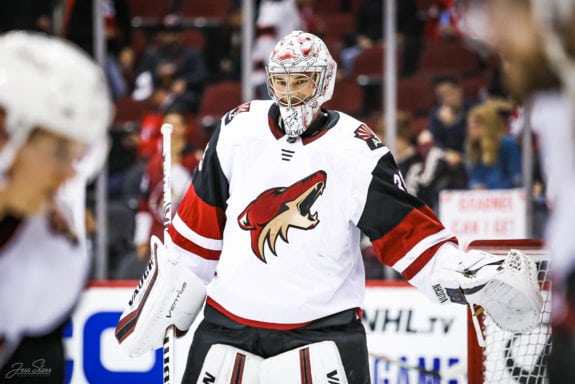
Kuemper had shown flashes of brilliance before, but once he was with the Kings, he became unbeatable. In 19 starts, he lost just one game in regulation, and he was suddenly one of the hottest goalies at the 2018 trade deadline. The Arizona Coyotes leaped at the opportunity to find some consistent goaltending and sent Tobias Rieder and Scott Wedgewood to the Kings for Kuemper. The 6-foot-5 Saskatoon native has since struggled with some injury concerns, but has emerged as an All-Star and, in 2019-20, an early contender for the Vezina Trophy.
Round 7, 190th – Brad Peltz, LW (Avon Old Farms H.S., Conn.)
The Senators took another unranked, overage player in Peltz in the seventh round. He had been passed over at the 2008 draft despite scoring 31 points in 27 games for his high school team. He was named the captain of Avon Old Farms in 2008-09, but failed to record a single point in 25 games. He joined Yale in 2010-11, where he’d play for two seasons before joining the Senators’ organization with the ECHL’s Elmira Jackals. However, numerous injuries derailed his career, and he retired in 2014, going on to found the company MyMO, a hospital wait-list management app.
Missed Opportunity: Nate Schmidt, D – never drafted
It’s common for late-round picks to rarely pan out, but the Senators could have taken a chance on another high school hockey player in Nate Schmidt, who was ranked 162nd among North American skaters. He would go undrafted in all his years of his eligibility, eventually signing a contract with the Washington Capitals in April 2013 after a successful career at the U. of Minnesota, where he was twice an All-Academic and All-Star.
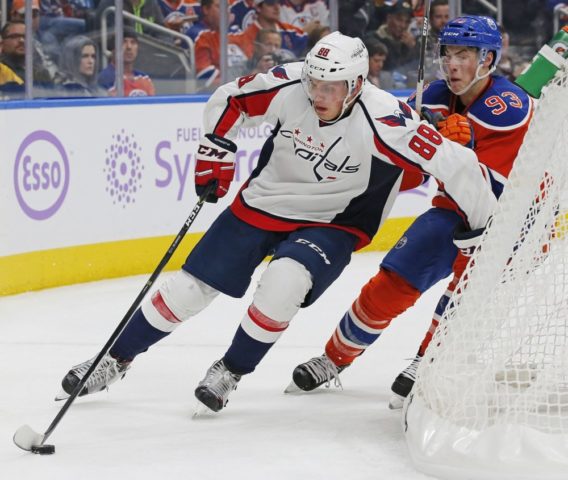
Schmidt spent four seasons with the Capitals organization, slowly climbing the depth chart until he was a regular bottom-pairing option. When he was claimed by the Vegas Golden Knights at the 2017 Expansion Draft, he was finally given the opportunity on the top pairing and has gone on to be one of the stars of the franchise, scoring at least 30 points in each of his three seasons with the team.
Round 7, 191st – Michael Sdao, D (Lincoln Stars, USHL)
The Senators’ final pick was used on another unranked defender playing in the USHL. Michael Sdao was nearly as big as Cowen, standing 6-foot-4 and weighing over 200 pounds, but his game was built around being a tough guy. In 51 games with the Lincoln Stars, he had 10 points and 162 penalty minutes. He signed an entry-level deal with the Senators after spending four seasons at Princeton University, but left the organization in 2015-16 in a trade to the Buffalo Sabres. Currently, he is a depth player with the ECHL’s Adirondack Thunder.
Missed Opportunity: Ondrej Palat, drafted 208th in 2011 by the Tampa Bay Lightning
In 2009, Palat was ranked the 84th among European skaters, but would not get drafted until 2011. He was on the younger side, having just turned 18 three months before the draft, but had played very well in the Czech U20 league, scoring 56 points in 48 games and helping his team claim the league’s championship.
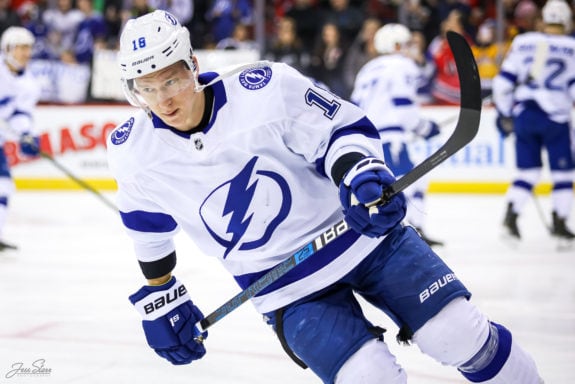
No team took the risk and the Lightning were left to reap the benefits two years later. Palat has scored over 50 points three times in his eight seasons in the NHL and is a fixture on the team’s second line. For a team that needed help on the wing, the Senators could have addressed that concern with their final pick of the 2009 draft.
Overall Grade: C
The Senators did about as well as anyone could have hoped at the 2009 draft, selecting four players who would emerge as top prospects within the system. There were stars littered all throughout the draft, and they managed to find a few while missing others. Impatience and injuries eventually took all these players away from Ottawa, but the team was able to get at least some assets in return, including Duclair, White, and several draft picks that could be used to find future hidden gems.
The post Ottawa Senators 2009 Draft Review appeared first on The Hockey Writers.
Popular Articles

















































 Blackhawks Chicago
Blackhawks Chicago Panthers Florida
Panthers Florida Penguins Pittsburgh
Penguins Pittsburgh Rangers New York
Rangers New York Avalanche Colorado
Avalanche Colorado Kings Los Angeles
Kings Los Angeles Maple Leafs Toronto
Maple Leafs Toronto Bruins Boston
Bruins Boston Capitals Washington
Capitals Washington Flames Calgary
Flames Calgary Oilers Edmonton
Oilers Edmonton Golden Knights Vegas
Golden Knights Vegas Senators Ottawa
Senators Ottawa Lightning Tampa Bay
Lightning Tampa Bay Flyers Philadelphia
Flyers Philadelphia Red Wings Detroit
Red Wings Detroit Islanders New York
Islanders New York Sabres Buffalo
Sabres Buffalo Devils New Jersey
Devils New Jersey Hurricanes Carolina
Hurricanes Carolina Blue Jackets Columbus
Blue Jackets Columbus Predators Nashville
Predators Nashville Stars Dallas
Stars Dallas Jets Winnipeg
Jets Winnipeg Wild Minnesota
Wild Minnesota Blues St. Louis
Blues St. Louis Mammoth Utah
Mammoth Utah Ducks Anaheim
Ducks Anaheim Canucks Vancouver
Canucks Vancouver Sharks San Jose
Sharks San Jose






